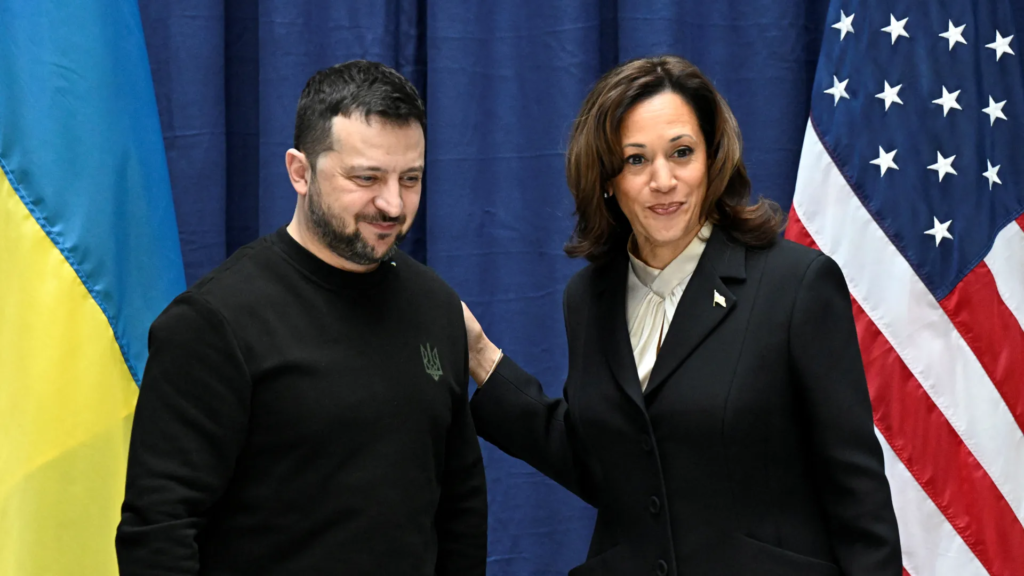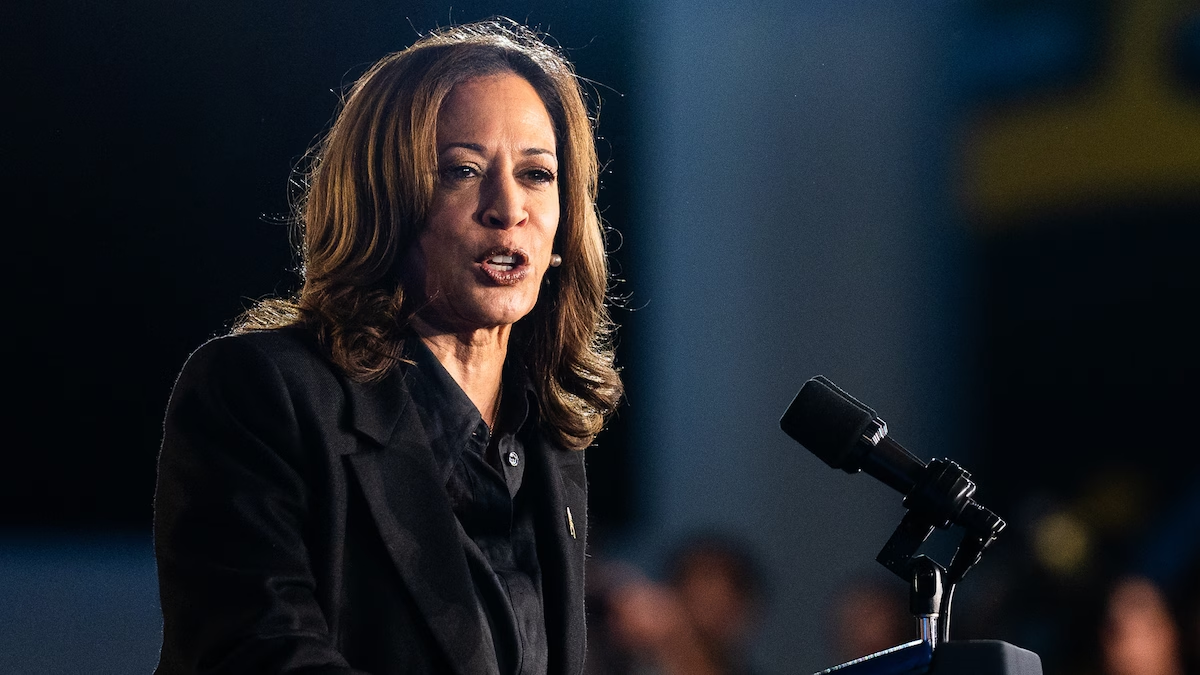Former President Donald Trump has been vocal in his recent campaign rallies, asserting that a Kamala Harris presidency could lead the United States toward a devastating global conflict.
Trump’s pointed criticism comes as he competes in a contentious race, and he has claimed that Harris lacks the necessary experience and competence to handle complex international relations.
Speaking at a rally in Pennsylvania, Donald Trump suggested that Harris would be ill-equipped to manage delicate foreign policy matters, particularly when facing adversaries like Russia’s Vladimir Putin and China’s Xi Jinping.
Trump’s comments about Harris’s alleged “incompetence” have ignited a debate, with his critics accusing him of exaggerating and fearmongering, while his supporters argue that the current administration’s approach to foreign policy has already led to mounting global tensions.
Trump’s statements play on a growing anxiety among American voters about international relations, especially in the wake of escalating conflicts in the Middle East and Ukraine, both of which have highlighted the complexities of modern geopolitical challenges.
In light of these concerns, Trump’s rhetoric focuses on presenting himself as the candidate who can steer the country away from conflict.
Trump’s Warnings and Criticisms of Kamala Harris’s Foreign Policy Capabilities
Donald Trump has positioned himself as a candidate capable of preventing a third world war, claiming that Harris’s perceived lack of expertise would exacerbate existing global tensions. During the Pennsylvania rally, Trump emphasized that Harris’s leadership could lead to the U.S. “gambling with the lives of millions” if she were to become president.
He has argued that her administration would not be able to withstand pressure from powerful foreign leaders, framing her as unsuited to negotiate with individuals like Putin and Xi. Donald Trump warned that her potential incompetence could inadvertently escalate diplomatic tensions into full-scale military confrontations.
Read : Trump Got Shot in the Side of the Head at His Rally in Pennsylvania: Watch
The former president’s statements reflect his concerns about Harris’s capacity to address complex geopolitical issues at a time when the U.S. is already involved in multiple international crises.
Analysts have noted that Trump’s campaign strategy has consistently underscored a perceived disconnect between the current administration’s approach and the traditional American stance of deterrence and strength.
Read : Salt Typhoon: The Chinese Group That Tried to Hack Donald Trump’s Phone
Donald Trump’s rhetoric not only suggests that Harris lacks the skills needed for successful diplomacy but also implies that her inexperience could lead the U.S. into unnecessary conflicts. This emphasis on her potential inability to manage adversarial relationships is a cornerstone of Trump’s argument against a Harris presidency.
While some political analysts argue that Trump’s comments are exaggerated, others point to the ongoing hostilities in Ukraine and the Middle East as evidence that U.S. foreign policy is facing significant challenges.
Trump has highlighted these conflicts as failures of the Democratic administration’s strategies, using them as examples to reinforce his claims about Harris’s inexperience. For Trump, these international issues offer tangible proof that America’s leadership needs a change, one that he believes he can provide.
Kamala Harris’s Allies Push Back: Accusations of Fearmongering and Fascism
Harris and her supporters have responded sharply to Donald Trump’s allegations, contending that his criticisms are a calculated attempt to incite fear among the American electorate.
Harris’s allies argue that Trump’s alignment with authoritarian figures like Putin and Kim Jong Un, leaders known for their opposition to Western democratic values, shows that he is out of step with the principles the U.S. stands for.
They accuse him of having a troubling admiration for strongman leaders and insist that his views on foreign policy are deeply concerning.
Harris’s supporters maintain that Trump’s foreign policy, marked by admiration for autocratic regimes, could weaken America’s standing on the world stage and put democratic alliances, like NATO, at risk.
They assert that Harris, in contrast, is committed to strengthening alliances with democracies worldwide, particularly with NATO members, to counterbalance the influence of authoritarian states. In their view, Donald Trump’s stance undermines the core tenets of democratic alliances and shifts U.S. foreign policy towards a position that tacitly endorses authoritarianism.
Trump’s critics have gone so far as to label him a “fascist,” charging that his rhetoric and policies cater to anti-democratic forces at the expense of longstanding democratic partnerships.
Furthermore, Harris’s allies argue that Donald Trump’s attacks on her competency are an attempt to distract from his own foreign policy record, which they claim often catered to autocrats and disregarded critical alliances.
They argue that Harris, as vice president, has been a consistent advocate for maintaining the democratic values on which the U.S. was founded, especially in the face of rising global authoritarianism.
Harris’s supporters contend that her commitment to democracy and her experience in dealing with world leaders make her well-equipped to handle America’s foreign policy in a manner that is both diplomatic and assertive, fostering a climate of stability rather than conflict.
The Role of Current Global Conflicts in the U.S. Presidential Campaign
The ongoing conflicts in Ukraine and the Middle East have become a significant focal point in the 2024 presidential race, as both candidates leverage these issues to support their narratives.
Donald Trump’s argument that Harris would “get us into World War III” resonates with voters who are concerned about the U.S.’s involvement in foreign wars, especially those who feel that America’s role in global affairs has become too interventionist.
Trump’s campaign appeals to these voters by promising a more isolationist approach, one that would avoid foreign entanglements and prioritize America’s interests.
In contrast, Harris’s approach reflects a more traditional U.S. foreign policy, one that emphasizes cooperation with allies and support for democratic ideals. Her supporters argue that a strong presence in international affairs is necessary to prevent the spread of authoritarianism and to ensure global stability.

They claim that Harris’s commitment to working with NATO allies is a vital part of maintaining peace and avoiding conflict, as collective security agreements are designed to deter aggression from authoritarian states like Russia. Her supporters also argue that Trump’s isolationist stance could embolden adversarial states by signaling a retreat from America’s role as a global leader.
With the 2024 election approaching, both candidates are using the current geopolitical climate to argue for their respective visions of U.S. foreign policy. For Donald Trump, the recent conflicts highlight what he describes as the failures of the current administration and underscore the dangers of a Harris presidency.
His claim that Harris’s “gross incompetence” would lead to World War III is an attempt to position himself as a safeguard against global conflict. Harris, on the other hand, presents herself as a stabilizing force, committed to supporting allies and defending democratic values on the international stage.
The debate over Kamala Harris’s competence to handle foreign policy has become a defining issue in the 2024 presidential race. Trump’s assertion that a Harris presidency would lead the U.S. toward a third world war reflects his strategy of emphasizing strong, decisive leadership to avoid global conflict.
His criticisms focus on Harris’s perceived inexperience and suggest that her approach to foreign policy would lack the strength needed to deter adversaries. Meanwhile, Harris’s allies argue that Trump’s foreign policy record, marked by his admiration for autocratic leaders, poses a greater risk to democracy and global stability.
As the election nears, the American public is being asked to choose between two contrasting visions of the U.S.’s role in the world. For Trump, a more isolationist approach promises to keep America out of conflicts and safeguard its interests.
Harris, on the other hand, emphasizes the importance of cooperation with allies and the defense of democratic principles as essential elements of a stable global order. The outcome of this election could have significant implications for America’s foreign policy and its relationship with the rest of the world.

